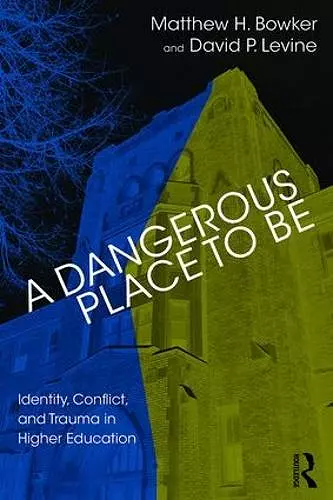A Dangerous Place to Be
Identity, Conflict, and Trauma in Higher Education
David P Levine author Matthew H Bowker author
Format:Paperback
Publisher:Taylor & Francis Ltd
Published:28th Feb '18
Currently unavailable, and unfortunately no date known when it will be back

This book investigates recent conflictual events on college and university campuses, including protests directed at university leaders deemed victimizers, debates over the inclusion of "trigger warnings" on course materials, demands for "safe spaces," denials of venue to controversial speakers, rejections of free speech as a norm governing campus interactions, and calls for the resignation or expulsion of students, faculty, and administrators. The authors suggest that such conflicts in universities express, with particular poignancy, difficulties encountered in the process of identity-formation, difficulties that include the management of ambivalent desires and fantasies concerning the relations between the ideal of self-determination and the protection offered by groups, the interpretation of encounters with difference, the movement from life in the family to life in civil society, and the need to find safety in the inner world as well as danger in the world outside. What makes the links between university-based conflict and the vicissitudes of identity difficult to see is that most controversies have been marked by efforts to ignore or disguise experiences in individuals' inner worlds and to focus, instead, on groups, group identities, and group fantasies about victimization that offer collective (social) defenses. A Dangerous Place to Be strives to clarify these links by applying psychoanalytic insights to several cases emblematic of recent university conflicts, revealing them to be enactments of inner dramas involving the discovery of difference in the self and in others.
"In recent years, issues surrounding identity politics on campuses of higher-education have been the subjects of a good deal of commentary. Much of this commentary, unfortunately, has cast off more heat than light. In A Dangerous Place to Be, Matthew Bowker and David Levine not only bring a fresh and lively new perspective to these issues, but – and this is the great achievement of the book – recast the very terms of the question. Focusing on the place of Colleges and Universities as transitional spaces between family and civil society, Bowker and Levine argue that the character of controversies over race, trigger warnings, and campus speech must be understood within the context of, on the one hand, early identity formation, and, on the other, the changing economic functions of the University. This is a rich and ambitious book that raises the level of conversation. It is, at times, provocative, but never fails to be thought-provoking. Whether one agrees or disagrees with the analysis of any of the particular topics it addresses, it will leave one with a more complex sense of what is at issue."-Jeremy Elkins, Bryn Mawr College
"‘Campus politics’, on stage, screen, between the covers, and as an everyday way of life has become a core site of the extreme weaponisation of language in contemporary USA, the UK and some Northern European social democracies. It is ‘a battlefield’, ‘an outrage’, and ‘a disgrace’. It is ‘generation snowflake at its most narcissistic’; it is ‘the intransigent oppressiveness of the old white patriarchal elite’. It is… well any of these and more: the invective is exhaustive and exhausting. Matthew Bowker and David Levine, though, are not having any of that. In this timely and important volume, A Dangerous Place to Be: Identity, Conflict, and Trauma in Higher Education, they set out a different perspective, psychoanalytical at its core, which uses Winnicott’s Object Relations Theory as the lens through which to examine how early experiences within the family establish identities which may subsequently struggle with voice, safety, self-realisation, and being, and how universities in their own socio-economically imposed re-identification may inadvertently replicate and reinforce these forms of damage. Bowker and Levine insist on the deployment of understanding, not moral posturing, and remind us that the empathetic but objective calm of the psychoanalyst’s intervention could offer spaces for the safe, contained development of self-knowledge more useful to young people than being dismissed as ‘over sensitive’ or taken entirely at face value. Mindful that university staff also feel threatened and frightened, in a study of organizational anxiety that Menzies would have been proud of, collusion is identified as another destructive dynamic that academics in their working world ignore at their peril. Carefully analysed examples of case studies of recent campus conflicts also provide opportunities to re-evaluate one’s possibly too blinkered and unserviceable position by examining the unconscious as well as social dimensions of these unhappy, pervasive, over-exposed troubles. Ironic as it seems, in relation to a study which so carefully avoids didacticism, to issue instructions, actually I would like to advocate that this book should be made compulsory. Everyone who works in, thinks about, studies in, or believes they have the measure of the contemporary campus really should read it."-Liz Frost, UWE Bristol, Editor, Journal of Psychosocial Studies
"An excellent work with a critical crescendo, Bowker and Levine trace universities’ attempts to relativize and compartmentalize students' cultural boundaries into a motley compilation of identities that is then envisioned in a utopian manner. The authors generate a discourse that examines the underlying assumptions about college students as somehow morally defective and in need of indoctrination, illuminate the process by which groups develop a sense of being historical victims as well as a fear of strangers, and incisively outline how the sloganeering of a pro-diversity identity entails unintended and potentially deleterious consequences. These processes have implicitly legitimized voluntary segregation and neotribalism, whereby students are given cues for prejudging one another through their own politics of exclusion. A vitally important work that critically examines how universities have overextended their efforts at creating a fantastic utopia, Bowker and Levine finally reveal that the emperor has no clothes."-Jack Fong, California State Polytechnic University
ISBN: 9781782204992
Dimensions: unknown
Weight: unknown
176 pages